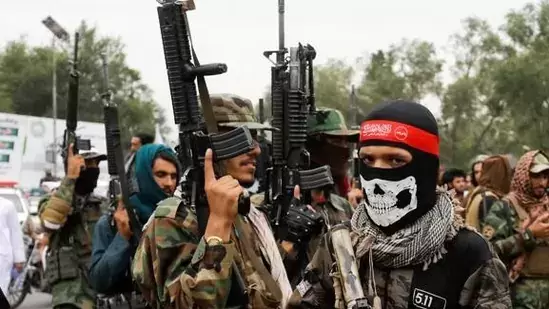Revenge, attack and not ceasefire: Tehrik- e-Taliban's new decree
The article has been authored by Soumya Awasthi, consultant, Tony Blair Institute for Global Change, London.
After approximately six months of truce between the Tehreek-e-Taliban Pakistan (TTP), known as the Pakistan Taliban and the government of Pakistan, the infamous group has issued a decree recently advocating revenge, attack and not ceasefire, opting to reopen the conflict with the Pakistani government. Interestingly, the conflict between the Pakistani government and the Pakistani Taliban erupted only days before General Asim Munir assumed command of the Pakistani army on November 29 and two days before the England cricket team was to land on Pakistani soil. Mohammad Khurasani, a spokesperson for TTP, informed the media through a text message that its leadership is breaking up with the government.

The organisation asserts that the extended truce was being terminated because the Pakistani army continued to attack the mujahideen of the TTP. In its official letter, the ministry of defence of the TTP says, "…you must conduct assaults everywhere you can since military operations are occurring against mujahideen in several regions". The Pakistan Taliban addressed its militants in a message, according to Pakistan's Dawn newspaper. It is the timing which matters the most here. TTP announced the breakup with the government. The England cricket team was in Pakistan when TTP declares an attack on every part of the country. Similarly, last year when the New Zealand cricket team landed in Pakistan in the year 2021, they cancelled the tour on grounds of the terror threat.
The TTP organisation opposes Pakistan's constitution and wants to impose sharia law instead because it believes democracy is un-Islamic. The organisation wants that strict Islamic rules to be charged, all essential members of the group detained by the government to be freed, and the merging of Pakistan's regions with Khyber Pakhtunkhwa province to be undone. The TTP has been carrying out attacks in Dera Ismail Khan, South Waziristan and North Waziristan districts in Khyber Pakhtunkhwa. This year on November 16, 2022, TTP attacked the police patrol unit in Lakki Marwat, which killed six police personnel. The organisation has been escalating attacks since the Pakistani government and TTP's discussions broke down in September 2022.
In July 2022, a 17-member team comprising the Afghan Taliban tribal chiefs and leaders arrived in Kabul to resume the conversation with the TTP. The Pakistani government and the Pakistani Taliban faction have been brought together through mediation by the Afghan Taliban. As per senior Pakistani journalist, Mushtaq Yousafzai, between May to July 2022, approximately 600-700 militants entered the southern district of the Khyber region.
According to Dawn, Mufti Taqi Usmani, a Pakistani cleric who was part of the team and respected by both the Afghan Taliban and the TTP organisation, told the TTP delegation that he had read Pakistan's constitution and found nothing that was anti-Islamic.
Mufti Usmani also stated that even if the organisation asserts that one or two provisions of the constitution are un-Islamic, it is not their responsibility to modify or defend their conduct in protesting against the government.
It is anticipated that the terrorist assaults and the conflict between the Pakistani army and TTP rebels will intensify in the country's tribal regions. In Waziristan, northwest Pakistan, for instance, after battling with the Pakistani army, 10 Taliban terrorists, including a TTP commander named Tipu, were killed. The security forces also sustained fatalities, though the precise number could not be confirmed.
As the conflict with the TTP organisation continues, Generap Asim Munir will likely face the challenge in the coming days. His predecessor, General Qamar Javed Bajwa, had a deep hatred for the TTP and had helped organise several strikes against it. This may have collateral damage on the current chief's tenure when the militant group avenges the loss it faced due to multiple strikes.
Meanwhile, in the ministry of defence, there were reports that TTP members are defecting to the Islamic States in Khorasan (ISK) or joining hands with Hafiz Gul Bahadur, who has dissociated himself from the core TTP due to disagreements on specific acts of the Mehsud faction.
It's been merely a month since Pakistan managed to convince the members of the Financial Action Task Force (FATF) to remove it from the Grey List. However, now that TTP is showing signs of rebellion, it is feared that Pakistan will be struggling to contain it.
In an editorial published in September this year by the Dawn, it was assessed that Pakistan's effectiveness is low on anti-money laundering and combating the financing of terror goals, even though the country is compliant with the technical recommendations of FATF. As per the local reports, there have been 60% rise in terrorism and 132 attacks in the last three months.
In the last month, almost 50 acts of terror have occurred in the Balochistan area. It has threatened the presence of the Chinese in Balochistan working on the China-Pakistan Economic Corridor projects, raising concerns in Beijing. Pakistan, as well as the international community, is worried about Afghan soil being used by the TTP and Baloch Liberation Army (BLA).
Though not much is clear as of now regarding the TTP's current ceasefire violation, Pakistani officials are still awaiting an official statement. Mushtaq Yousafzai argues that one of the causes for this failure is that after Lt Gen Faiz Hameed worked towards a truce, no one owned the peace process within the political fraternity.
All Access.
One Subscription.
Get 360° coverage—from daily headlines
to 100 year archives.



HT App & Website







